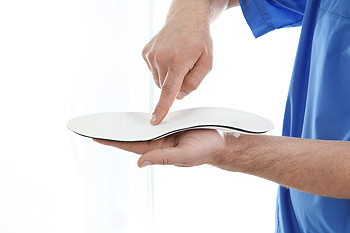How Are Orthotics Made?
Monday, 09 March 2020 00:00 Orthotics are known as insoles that fit inside shoes, which may help to provide the necessary support needed for specific foot conditions. They are custom designed for each patient, and the process begins with taking a plaster mold of the affected foot. The necessary adjustments can be made for size, as this will help the insole to fit perfectly inside the shoe. Some of the reasons why patients choose to wear orthotics may consist of correcting an abnormal walking pattern, or to relieve pressure in a portion of the foot. Additionally, orthotics may help to reduce chronic foot pain, as well as improve certain foot alignments. If you would like more information about custom-made orthotics, please consult with a podiatrist who can determine if they are right for you.
Orthotics are known as insoles that fit inside shoes, which may help to provide the necessary support needed for specific foot conditions. They are custom designed for each patient, and the process begins with taking a plaster mold of the affected foot. The necessary adjustments can be made for size, as this will help the insole to fit perfectly inside the shoe. Some of the reasons why patients choose to wear orthotics may consist of correcting an abnormal walking pattern, or to relieve pressure in a portion of the foot. Additionally, orthotics may help to reduce chronic foot pain, as well as improve certain foot alignments. If you would like more information about custom-made orthotics, please consult with a podiatrist who can determine if they are right for you.
If you are having discomfort in your feet and would like to try orthotics, contact Dr. Anna Petrov from Family Foot & Ankle Care. Our doctor can provide the care you need to keep you pain-free and on your feet.
What Are Orthotics?
Orthotics are inserts you can place into your shoes to help with a variety of foot problems such as flat feet or foot pain. Orthotics provide relief and comfort for minor foot and heel pain but can’t correct serious biomechanical problems in your feet.
Over-the-Counter Inserts
Orthotics come in a wide variety of over-the-counter inserts that are used to treat foot pain, heel pain, and minor problems. For example, arch supports can be inserted into your shoes to help correct overarched or flat feet, while gel insoles are often used because they provide comfort and relief from foot and heel pain by alleviating pressure.
Prescription Orthotics
If over-the-counter inserts don’t work for you or if you have a more severe foot concern, it is possible to have your podiatrist prescribe custom orthotics. These high-quality inserts are designed to treat problems such as abnormal motion, plantar fasciitis, and severe forms of heel pain. They can even be used to help patients suffering from diabetes by treating foot ulcers and painful calluses and are usually molded to your feet individually, which allows them to provide full support and comfort.
If you are experiencing minor to severe foot or heel pain, it’s recommended to speak with your podiatrist about the possibilities of using orthotics. A podiatrist can determine which type of orthotic is right for you and allow you to take the first steps towards being pain-free.
If you have any questions please contact one of our offices located in Wheeling and Chicago, IL . We offer the newest diagnostic and treatment technologies for all your foot and ankle needs.







